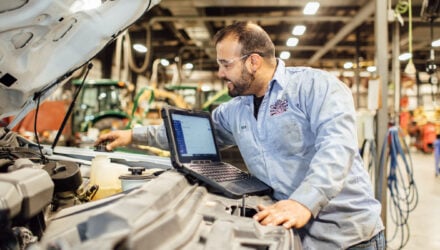
EXPERT: Andy Crathorne, of Car Camera Shop
In our latest Expert Blog, Andy Crathorne, Digital Project Manager at Car Camera Shop, explains why investing in dash cams for your fleet should be on your to-do list…
Protecting your fleet is becoming more and more important with increasingly crowded roads and higher insurance premiums.
Saving money on fleet insurance and having irrefutable video evidence in case of an accident are just two of the benefits a dash cam provides.
According to the Royal Society for the Prevention of Accidents (RoSPA) there were an estimated 730,000 casualties on the road in 2012.
Consider how many road accidents there are without injury and you can imagine the sheer number of accidents on the UK’s roads.
Accidents are common so it’s important that you do as much as you can to deal with them quickly and affordably.
The Insurance Fraud Bureau recently reported that organised ‘Crash for Cash’ and the more recent variation ‘Flash for Cash’ scams are on the rise and cost the UK insurance industry over £390million every year, with nearly 20% of personal injury claims likely to be linked to one of these scams.
Since these incidents appear to be more and more common and are reported in the media with increasing regularity, dash cams are proving popular to help combat insurance fraud amongst fleet vehicles, especially when you consider that large vehicles are easy targets for fraudsters due to their size, manoeuvrability, and stopping distances.
Aside from saving money on fleet insurance premiums and providing irrefutable video evidence in case of an accident, dash cams have been proven to change the behaviour of drivers, making for safer and more aware drivers – resulting in fewer accidents.
The majority of insurance claims are classified as 50/50 fault distribution so valuable video evidence results in faster claims and protected no claims discounts.
For fleet managers, looking after your drivers and protecting your fleet is essential.
The footage from dash cameras can be used to monitor the performance of drivers and assist with customer complaints.
Onto the cameras themselves, there are many to choose from ranging from £70 for a budget camera all the way up to £400 for a top of the range dual lens camera.
Almost all cameras provide high quality HD video with many also offering GPS maps to track speed and location, wide angle lenses to capture more of the road, LCD screens for ease of use, dual lenses to capture footage ahead and behind, and g-sensors to automatically detect an accident.
What makes a dash camera different from any other type of camera is the fact that they automatically turn on/off with the vehicle, continually record by over-writing the oldest footage, automatically lock video when it detects an impact, and their compact size.
When choosing a dash camera you need to decide how you want to use it.
For example, if you want to easily swap it around different vehicles you’ll prefer a suction mounted camera.
On the flip side, if you’re buying for specific vehicles you should consider an adhesive mounted camera with a hard-wire kit connecting the camera directly to the battery.
Some dash cameras also have locks over the memory card to prevent removal of the card and therefore loss of the footage.
Dash cameras are required by law for lorries and HGVs in many other countries, including most recently, Spain.
Their popularity is growing rapidly and with more fleet insurance companies recognising them and providing discounts it’s no wonder they’re becoming an essential piece of kit for fleet vehicles.






















